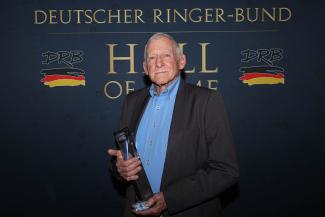Tzeno Tzenov, Longtime Bureau Member and President of European Council, Dies at 80
Monday, June 1, 2020 - 14:25 By United World Wrestling Press

SOFIA, Bulgaria (June 1) - Tzeno TZENOV, a bureau member during some of wrestling's biggest moments, has died. He was 80.
Born in Markovo Village in 1939, Tzenov graduated from the “Kliment Ohridski” of Sofia University with a Master of Arts in History and Archeology.
The son of a former bureau member, Tzenov had an eye for the mats and ways to help the sport grow, starting during the 1980's during his tenure as Secretary of the Bulgarian Wrestling Federation and later, vice president. Tzenov also briefly served as the President of the Bulgarian Wrestling Federation from 1987-1989.
Away from wrestling, Tzenov was elected as Secretary-General of the Bulgarian Union for Physical Culture and Sport from 1989 to 1993. From there he transitioned into an important role as a Member of the Bulgarian Olympic Committee where he had remained since 1992.
Tzenov was also the executive director of “Bulgarian Sport” Charity Foundation since 2004 and was the President of the Control’s Council at the Bulgarian Olympic Committee since November 2005.
Mr. Tzenov's impact on wrestling is well-known, becoming a member of the European Council of FILA/UWW in 1978 where he was later elected president in 1995. Tzenov was first elected to the FILA/UWW Bureau in 2002 and subsequently re-elected in 2008 and 2014. In 2016, Tzenov was named as a bureau vice-president.
“As a long-time serving executive in sports, and as a historian, Mr. Tzenov had a great knowledge of wrestling’s culture and heritage, in particular in the European context," said United World Wrestling president Nenad Lalovic. "Combined with his experience gained in the sport’s highest instances in Bulgaria and in the International Federation, he had a pivotal role in leading wrestling towards modernity while safeguarding the core values of our sport”.
"He will be dearly missed by everyone in the wrestling community and our deepest condolences to his wife, friends and colleagues."
Further decisions about Mr. Tzenov's funeral will be made in the coming days.


Share your thoughts.
Comments